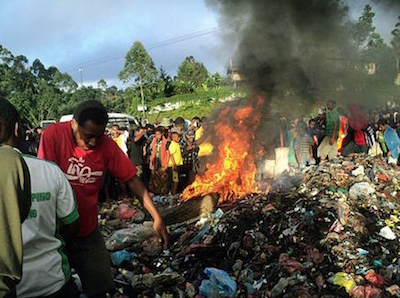By Rebecca Kuku in Port Moresby
Nine years ago widespread publicity given to the public execution of Kepari Leniata, who was falsely accused of sorcery and burnt by a mob in broad daylight in Papua New Guinea’s third-largest city Mt Hagen, shocked people around the world.
The tragic death also highlighted the problem of Sorcery Accusation Related Violence (SARV) in the country.
Leniata was a 20-year-old mother of two accused of sorcery. She was stripped naked, doused in petrol and burnt alive in front of hundreds of people on 6 February 2013.
She was wrongly accused of killing a six-year-old boy that died at Mt Hagen General Hospital and the boy’s relatives tortured her with a hot iron rod, stripped her naked, tied her hands and legs and threw her into a pile of burning tyres as hundreds watched.
The gruesome photos of Leniata being burnt alive were featured on the front pages of both the country’s national dailies.
Policemen at scene
Several policemen were at the scene but were helpless to do anything to save the women because they were outnumbered by the perpetrators.

Four years later, in November of 2017, Leniata’s six-year-old daughter was tortured in Enga by several men after one of her friends became sick.
She was tortured for a week before word spread and she was rescued.
Her only crime was being the daughter of a woman accused of sorcery and burnt to death.
To this date, the perpetrators involved in both cases still remain at large.
Rebecca Kuku is a senior PNG Post-Courier reporter. Republished with permission.
Article by AsiaPacificReport.nz






